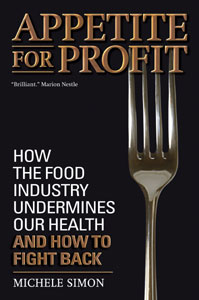Weight-Loss Drug Told to Lose the Advertising
Submitted by Bob Burton on

Submitted by Bob Burton on
 In December 2006, I interviewed author Michele Simon about her book, "Appetite for Profit: How the Food Industry Undermines our Health and How to Fight Back." The excerpts below are from that original interview, which took place on WORT, community radio in Madison, Wisconsin. For more information on Michele and her work, please visit her website.
In December 2006, I interviewed author Michele Simon about her book, "Appetite for Profit: How the Food Industry Undermines our Health and How to Fight Back." The excerpts below are from that original interview, which took place on WORT, community radio in Madison, Wisconsin. For more information on Michele and her work, please visit her website.
Judith Siers-Poisson (JSP): How did you personally become so involved and interested in food politics?
Michele Simon (MS): It started about 10 years ago when I was struggling with my own weight and turned to a vegetarian diet and, lo and behold, I lost the weight I was struggling with. And then, from there, I started to learn all of the other ways our diet impacts our own health, in addition to the environment, animal welfare, and labor, and so many aspects of society -- I was just amazed at how much was impacted by those food choices.
Submitted by Diane Farsetta on
"The politics of Texas power and pollution have moved suddenly into the living rooms of millions of Texans," over "electric companies' plans to build 16 coal-burning plants using conventional technology that pollutes more than a newer coal system." In addition to lobbying, interested parties are launching ad campaigns and websites and forming new "pressure groups." Campaigning for the coal plants are: Texans for Affordable and Reliable Power, which receives funding from the Dallas-ba
Submitted by Diane Farsetta on
A new study "funded by the Robert Wood Johnson Foundation and published in the Jan. 29 Annals of Family Medicine, claims the $4.5 billion" direct-to-consumer drug ad (DTC) industry "produces ads that are more emotional than informational, and may be convincing Americans that they're sicker than they really are," reports Advertising Age.
Submitted by Jonathan Rosenblum on
Submitted by Bob Burton on
The $4 billion a year spent by the drug industry on direct-to-consumer advertising promoting drugs is generating a political backlash. "There's a lot of support for a ban on direct-to-consumer advertising, and the Democrats know it," said Gary Ruskin, Commercial Alert's executive director.
Submitted by Diane Farsetta on
"Consumers' viewing and reading habits are so scattershot now that many advertisers say the best way to reach time-pressed consumers is to try to catch their eye at literally every turn," the New York Times writes. Subsequently, ads are turning up in the strangest places: airport security lines, subway turnstiles -- even chicken eggs. "Ubiquity is the new exclusivity," said ad executive Linda Kaplan Thaler. "Alternative media" ad spending totaled $387 million in 2006, up from $24 million in 2000.
Submitted by Bob Burton on
A survey of 39,090 patients and 335 primary-care physicians reveals the power of direct-to-consumer advertising of drugs.
Submitted by Judith Siers-Poisson on
Wal-Mart is launching a massive PR blitz to try to staunch the criticism it receives from concerned consumers and activists working on issues like labor, the environment, healthcare and human rights. The TV broadcast ads on network and cable channels will focus on "Sam's Dream," referring to founder Sam Walton.
Submitted by Jonathan Rosenblum on
Channel One, the controversial advertising-funded TV network that reaches 7 million secondary schools, faces declining revenue and its owner, Primedia, is looking to sell.
Center for Media and Democracy (CMD)
520 University Ave, Ste 305 • Madison, WI 53703 • (608) 260-9713
CMD is a 501(c)(3) tax-exempt non-profit.
© 1993-2024